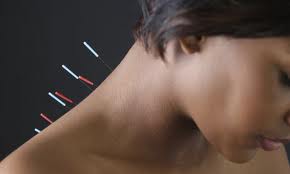FAQ
What is acupuncture?
Acupuncture is the insertion of fine needles into the body at  specific points shown as effective in the treatment of health problems. Originated in China more than 2,000 years ago, acupuncture is one of the oldest, most commonly used medical practices in the world. According to theories of traditional Chinese medicine, the human body has hundreds of acupuncture points connected via pathways, or meridians, which are routes of energy flow. Disruption of the energy flow can cause disease. Acupuncture can improve the flow of energy when applied at the right points and with the right technique.
specific points shown as effective in the treatment of health problems. Originated in China more than 2,000 years ago, acupuncture is one of the oldest, most commonly used medical practices in the world. According to theories of traditional Chinese medicine, the human body has hundreds of acupuncture points connected via pathways, or meridians, which are routes of energy flow. Disruption of the energy flow can cause disease. Acupuncture can improve the flow of energy when applied at the right points and with the right technique.
What’s the evidence?
Many studies have demonstrated that acupuncture can cause multiple biological responses. These responses can occur locally, i.e., at or close to the site of application, or at a distance, mediated mainly by sensory neurons to many structures within the central nervous system. This can lead to activation of pathways affecting various physiological systems in the brain as well as in the periphery. Considerable evidence supports the claim that opioid peptides are released during acupuncture and that the analgesic effects of acupuncture are at least partially explained by their actions. Stimulation by acupuncture may also activate the hypothalamus and the pituitary gland, resulting in a broad spectrum of systemic effects. Alteration in the secretion of neurotransmitters and neurohormones and changes in the regulation of blood flow, both centrally and peripherally, have been documented. There is also evidence that there are alterations in immune functions produced by acupuncture.
What is it like having acupuncture?
Acupuncture is performed with very fine pre - sterilised disposable needles. Patients report different feelings associated with acupuncture, but most feel minimal pain as the needle is inserted. The patient might feel some numbness, heaviness, tingling, or hot sensation. Acupuncture makes some people report feeling energized by the treatment, while others say they feel relaxed.
In addition to needles, other forms of stimulation are sometimes used, including:
▪ Impulses of electric current
▪ Pressure (acupressure)
▪ Heat
▪ Friction
▪ Suction
What problems can acupuncture help?
For millenniums, acupuncture has been used to treat a wide range of health problems from simple acute sprains to long term debilitating illnesses. In modern times, the World Health Organization (WHO), has compiled a list of diseases and disorders that can be treated with acupuncture. Please refer to the following webpage: http://apps.who.int/medicinedocs/en/d/Js4926e/5.html?
Sometimes the effects of acupuncture depend a lot on the practitioner's personal experience. We suggest you consult your practitioner for individual condition.
How many sessions will I need?
This will depend on the individual patient and the nature of the condition. Normally you will be asked to come once or twice a week at first. Some change is usually felt within four or five treatments, although sometimes just one or two treatments are sufficient. For long-standing and chronic conditions, once they have stabilised you may need top-up treatments.
I’m scared of needles – can I still have acupuncture?
Yes. Acupuncture needles are very much finer than the needles used for injections and blood tests. Some small gauge needles are so fine that the insertion is extremely light. You may not even feel them penetrate the skin and once in place they are hardly noticeable.
Is acupuncture safe?
There are very few side effects from acupuncture when practised by a fully qualified practitioner of traditional acupuncture. Any minor side effects that do occur, such as dizziness or bruising around needle points, are mild and self-correcting.